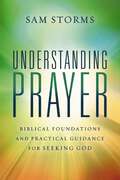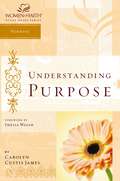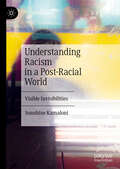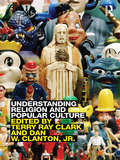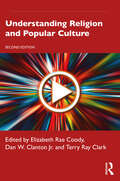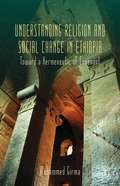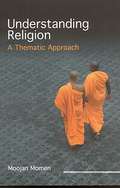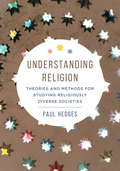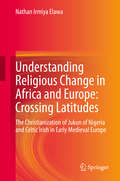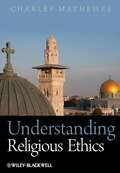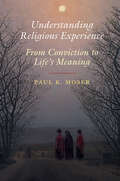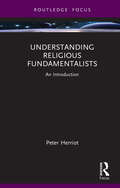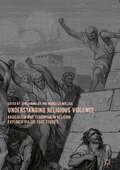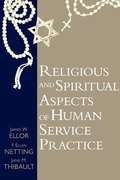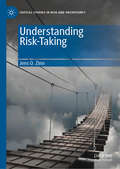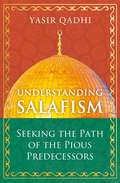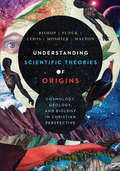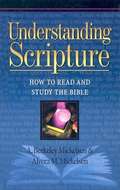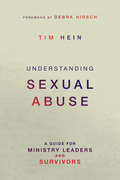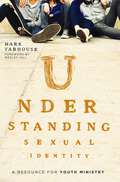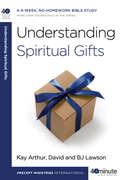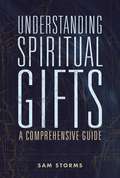- Table View
- List View
Understanding Prayer: Biblical Foundations and Practical Guidance for Seeking God
by Sam StormsA Comprehensive Theological Guide to the Practice and Power of PrayerIn Understanding Prayer, author, pastor, and scholar Sam Storms unpacks the meaning and power of prayer through a close reading of Scripture with special focus on the life and ministry of Jesus, the apostle Paul, and James. With scholarly wisdom and pastoral application, he addresses topics like persisting in prayer, praying for pleasure, and warfare prayer, exploring how prayer is a profoundly supernatural experience. He also addresses several controversial texts and challenging questions about prayer including:Does prayer really change anything?Why praying in Jesus's name is not a magical incantationThe most shocking prayer the apostle Paul never prayedHow we can ask God for wisdom to make sense of the seemingly senselessSuffering, healing, and the prayer of faithHow prayer brings us peace and imparts spiritual wisdomUnderstanding Prayer is an indispensable resource, serving as both a comprehensive analysis and a practical guide for those seeking God through prayer. It offers a journey into the heart of prayer, transforming it from a mere ritual to a deeply personal spiritual experience that develops and grows our knowledge, understanding, and hunger for God.
Understanding Purpose: Women of Faith Study Guide Series (Women of Faith Study Guide Series)
by Carolyn Custis JamesWomen of Faith, renowned for their unique combination of personality and truth, offer fresh new messages in their fourth series of popular topical study guides. Titles include: Receiving God's Goodness Experiencing Spiritual Intimacy Contagious Joy Understanding Purpose Each study guide, teeming with insights and quotes from the conference speakers provides twelve weeks of Bible study, a leader's guide for small groups, and a special take-home reminder for each week's lesson.
Understanding Racism in a Post-Racial World: Visible Invisibilities
by Sunshine KamaloniThis book addresses the question: how can we talk about race in a world that is considered post-racial, a world where race doesn’t exist? Kamaloni engages with the tradition of everyday racism and traces the process of racialisation through the interaction of bodies in space. Exploring the embodied experience exposes the idea of post-racialism as a response to continued cultural anxieties about race and the desire to erase it. Understanding Racism in a Post-Racial World presents a broader question about what everyday encounters about race might tell us about the current cultural construction of race. The book provides a much-needed investigation of the intersection of race, bodies and space as a critical part of how bodies and spaces become racialised, and will be of value to students and scholars interested in understanding and discussing race across interdisciplinary areas such as cultural studies, communication, gender studies, geography, body studies, literature studies and urban studies.
Understanding Religion and Popular Culture
by Jr. Terry Ray Clark Dan W. ClantonThis introductory text provides students with a 'toolbox' of approaches for analyzing religion and popular culture. It encourages readers to think critically about the ways in which popular cultural practices and products, especially those considered as forms of entertainment, are laden with religious ideas, themes, and values. The chapters feature lively and contemporary case study material and outline relevant theory and methods for analysis. Among the areas covered are religion and food, violence, music, television and videogames. Each entry is followed by a helpful summary, glossary, bibliography, discussion questions and suggestions for further reading/viewing. Understanding Religion and Popular Culture offers a valuable entry point into an exciting and rapidly evolving field of study.
Understanding Religion and Popular Culture
by Terry Ray Clark Dan W. Clanton Jr. Elizabeth Rae CoodyUnderstanding Religion and Popular Culture 2nd edition provides an accessible introduction to this exciting and rapidly evolving field. Divided into two parts, Issues in Religion and Genres in Popular Culture, it encourages readers to think critically about the ways in which popular cultural practices and products, especially those considered as forms of entertainment, are laden with religious ideas, themes, and values. This edition has been thoroughly revised and includes five new chapters, updated case studies, and contemporary references. Among the areas covered are religion and film, food, violence, music, television, cosplay, and fandom. Each chapter also includes a helpful summary, glossary, bibliography, discussion questions, and suggestions for further reading/viewing. Providing a set of practical and theoretical tools for learning and research, this book is an essential read for all students of Religion and Popular Culture, or Religion and Media more broadly.
Understanding Religion and Social Change in Ethiopia
by Mohammed GirmaReligiosity is one aspect without which Ethiopian society cannot be fully understood. This book aims to map out the terrain of the discourse in religion-social change nexus in Ethiopian using the notion of covenant as an interpretive tool.
Understanding Religion: A Thematic Approach
by Moojan MomenWith the aid of hundreds of photographs, an in-depth exploration of the role of religionAn innovative, thematic presentation of the role of religion in human society, from traditional cultures to the modern world, this comprehensive account will prove invaluable for students, experts or the interested general readers seeking an understanding of the nature and significance of diverse religious experience. Drawing from all major religious traditions in the world, as well as a variety of non-religious disciplines such as psychology, philosophy and sociology, Momen's informative study covers everything from art and history to theology and the World Wide Web.
Understanding Religion: Theories and Methods for Studying Religiously Diverse Societies
by Paul Michael HedgesA cutting-edge introduction to contemporary religious studies theory, connecting theory to data. This innovative coursebook introduces students to interdisciplinary theoretical tools for understanding contemporary religiously diverse societies—both Western and non-Western. Using a case-study model, the text considers: A wide and diverse array of contemporary issues, questions, and critical approaches to the study of religion relevant to students and scholarsA variety of theoretical approaches, including decolonial, feminist, hermeneutical, poststructuralist, and phenomenological analysesCurrent debates on whether the term "religion" is meaningfulMany key issues about the study of religion, including the insider-outsider debate, material religion, and lived religionPlural and religiously diverse societies, including the theological ideas of traditions and the political and social questions that arise for those living alongside adherents of other religionsUnderstanding Religion is designed to provide a strong foundation for instructors to explore the ideas presented in each chapter in multiple ways, engage students in meaningful activities in the classroom, and integrate additional material into their lectures. Students will gain the tools to apply specific methods from a variety of disciplines to analyze the social, political, spiritual, and cultural aspects of religions. Its unique pedagogical design means it can be used from undergraduate- to postgraduate-level courses.
Understanding Religious Change in Africa and Europe: The Christianization of Jukun of Nigeria and Celtic Irish in Early Medieval Europe
by Nathan Irmiya ElawaThis book examines and compares the religious experience of an African group with a European one. It offers an ethnographical investigation of the Jukun of north central Nigeria. The author also organically weaves into the narrative the Christianization of the Irish in a comparative fashion. Throughout, he makes the case for an African Christianity connected to a Celtic Irish Christianity and vice-versa -- as different threads in a tapestry. This work is a product of a synthesis of archival research in three continents, interviews with surviving first-generation Christians who were active practitioners of the Jukun indigenous religion, and with former missionaries to the Jukun. On the Irish side, it draws from extant primary sources and interviews with scholars in Celtic Irish studies. In addition, pictures, diagrams, and excerpts from British colonial and missionary journals provide a rich contextual understanding of Jukun religious life and practices. The author is among the emerging voices in the study of World Christianity who advocate for the reality of "poly-centres" for Christianity. This perspective recognizes voices from the Global South in the expansion of Christianity. This book serves as a valuable resource for historians, anthropologists, theologians, and those interested in missions studies, both scholars and lay readers seeking to deepen their understanding of World Christianity.
Understanding Religious Ethics
by Charles MathewesThis accessible introduction to religious ethics focuses on the major forms of moral reasoning encompassing the three ‘Abrahamic’ religions: Judaism, Christianity, and Islam. Draws on a range of moral issues, such as examples arising from friendship, marriage, homosexuality, lying, forgiveness and its limits, the death penalty, the environment, warfare, and the meaning of work, career, and vocation Looks at both ethical reasoning and importantly, how that reasoning reveals insights into a religious tradition Investigates the resources available to address common problems confronting Abrahamic faiths, and how each faith explains and defends its moral viewpoints Offering concrete topics for interfaith discussions, this is a timely and insightful introduction to a fast-growing field of interest
Understanding Religious Experience: From Conviction to Life's Meaning
by Paul K. MoserIn this book, Paul K. Moser offers a new approach to religious experience and the kind of evidence it provides. Here, he explains the nature of theistic and non-theistic experience in relation to the meaning of human life and its underlying evidence, with special attention given to the perspectives of Tolstoy, Buddha, Confucius, Krishna, Moses, the apostle Paul, and Muhammad. Among the many topics explored in this timely volume are: religious experience characterized in a unifying conception; religious experience naturalized relative to science; religious experience psychologized in merely psychological phenomena; and religious experience cognized relative to potential defeaters from evil, divine hiddenness, and religious diversity. Understanding Religious Experience will benefit those interested in the nature of religion and can be used in relevant courses in religious studies, philosophy, theology, Biblical studies, and the history of religion.
Understanding Religious Fundamentalists: An Introduction (Routledge Focus on Religion)
by Peter HerriotThis book introduces the prominent role that fundamentalists play in religious, cultural, and political arenas.It begins by investigating religious fundamentalist groups and their psychological motivations for this counter-cultural adherence. Their extremely varied actions, argues the author, are based on two fundamental beliefs: that God speaks to them personally through his Word; and that they are involved in a cosmic war between God and Satan.. Subsequent chapters explore how fundamentalisms meet universal psychological needs for meaning, identity, agency, and self-esteem. Moving from individual psychology to social context, the latter half of the book explores how fundamentalist movements derive and exercise their authority and how leaders may strategise to appeal to external societies. The closing chapters seek to place the growth of fundamentalisms and their continued popularity in the social context of modernity and populism.With engaging discussion questions and suggestions for further reading, this book is ideal for students of social science and religion, as well as readers interested in the psychological roots of fundamentalism.
Understanding Religious Ritual: Theoretical approaches and innovations (Routledge Advances in Sociology)
by Gadi WolfsfeldAlthough numerous studies of religious rituals have been conducted by religious studies scholars, anthropologists, sociologists, and psychologists, it is rare to find a work that brings scholars from different disciplines together to discuss the similarities and differences in their research. This book represents contributions by leading scholars from several disciplines that show the diversity of approaches to religious rituals, while also providing cross-disciplinary perspectives on this topic. The goals of the chapters are to consider where the field currently stands in understanding religious rituals and what novel ideas can improve our knowledge about these practices; and furnish innovative applications of theory by discussing particular examples which are drawn from the authors’ fieldwork. The chapters cover Christian, Buddhist, Jewish, and Islamic rituals, thus providing a view of how ritual practices vary across the globe, but also how they share some important characteristics.
Understanding Religious Violence: Radicalism and Terrorism in Religion Explored via Six Case Studies
by James Dingley Marcello MollicaThis book addresses the problem of religiously based conflict and violence via six case studies. It stresses particularly the structural and relational aspects of religion as providing a sense of order and a networked structure that enables people to pursue quite prosaic and earthly concerns. The book examines how such concerns link material and spiritual salvation into a holy alliance. As such, whilst the religions concerned may be different, they address the same problems and provide similar explanations for meaning, success, and failure in life. Each author has conducted their own field-work in the religiously based conflict regions they discuss, and together the collection offers perspectives from a variety of different national backgrounds and disciplines.
Understanding Religious and Spiritual Aspects of Human Service Practice
by F. Ellen Netting James Ellor Jane M. ThibaultContending that despite current efforts to make social workers sensitive to differences of race, ethnicity, and gender, the diversity and impact of religious beliefs has often been overlooked, three professors of social work/human services offer a guide to direct practice concerns. Spiritual assessment, positive and pathological uses of religious practice, and the need for spiritual self-awareness among human-service workers are explored, as are issues related to community, congregation, and making of public policy. Annotation c. Book News, Inc., Portland, OR (booknews.com)
Understanding Risk-Taking (Critical Studies in Risk and Uncertainty)
by Jens O. ZinnThis book outlines and systematises findings from a growing body of research that examines the different rationales, dimensions and dynamics of risk-taking in current societies; providing insight into the different motivations and social roots of risk-taking to advance scholarly debates and improve social regulation. Conceptually, the book goes beyond common approaches which problematise socially undesirable risk-taking, or highlight the alluring character of risk-taking. Instead, it follows a broadly interpretivist approach and engages in examining motives, control, routinisation, reflexivity, skills, resources, the role of identity in risk-taking and how these are rooted in and framed by different social forces. Zinn draws on qualitative studies from different theoretical and conceptual backgrounds such as phenomenology, hermeneutics, pragmatism, feminism, class analysis, theory of practice and discourse analysis among others, to outline key distinctions and concepts central to the understanding of risk-taking. It will be a key resource for everyone who is concerned with the understanding and management of risk-taking in all kinds of social domains, such as immigration, youth, leisure sports, crime, health, finance, and social policy.
Understanding Salafism: Seeking the Path of the Pious Predecessors
by Yasir QadhiA comprehensive overview of the most misunderstood movement in modern Islam: Salafism.The Salafi movement invokes fear and dread in outsiders who treat Salafism as synonymous with religious extremism. For Salafis themselves, it&’s a jealously guarded title, always in danger of dilution. Salafism has changed the face of Islam; its ideas reach far outside its own ranks. Yet popular portrayals never go beyond hackneyed stereotypes. In Understanding Salafism, Dr Yasir Qadhi delves into the origins of the movement, from the earliest debates in Islam to Salafism today, in both the Western and Islamic worlds. In an analysis covering Salafism in the Middle East, Europe, the United States and Africa, he illuminates Salafism&’s theological ideas, the debates within Salafism about political participation, and its relationship to other schools in Sunni Islam.----- Yasir Qadhi is a resident scholar of the East Plano Islamic Center in Texas, and dean of the Islamic Seminary of America. He is one of the few people who has combined a traditional Eastern Islamic seminary education with Western academic training in the study of Islam. ----- Table of ContentsList of Figures Preface Conventions 1 Introduction: A Bird&’s Eye View of Salafism 2 A Comprehensive History of Salafi Thought: From its Origins to Modernity 3 Wahhabism and Salafism 4 Salafism and Islamism: A Case Study of the Muslim Brotherhood 5 The Phenomenon of Jihadi-Salafism 6 Global Salafism in the Contemporary World Epilogue Notes Bibliography Index
Understanding Scientific Theories of Origins: Cosmology, Geology, and Biology in Christian Perspective (BioLogos Books on Science and Christianity)
by John H. Walton Robert C. Bishop Larry L. Funck Stephen O. Moshier Raymond J. LewisThe question of origins remains a stumbling block for many. But just as the Psalmist gained insight into God's character through the observation of nature, modern scientific study can deepen and enrich our vision of the Creator and our place in his creation. In this often contentious field Bishop, Funck, Lewis, Moshier, and Walton serve as our able guides. Based on over two decades of teaching origins together in the classroom, the authors present a textbook exploring mainstream scientific theories of origins in astronomy, cosmology, chemistry, geology, biology, physical anthropology, and genetics. While many authors engage origins from a Christian perspective, this is the first work offering a full-fledged discussion of the scientific narrative of origins from the Big Bang through humankind, from biblical and theological perspectives accessible to a lay audience. Topics include Principles of biblical interpretation Close readings of relevant Genesis texts A comprehensive Trinitarian doctrine of creation Cosmic origins The geologic history of Earth The origin of life on Earth The origin of species and diversity of life Human origins New creation and creation care Science education Rather than the familiar scenario where science and faith compete, this book seeks to diffuse tensions by taking the inspiration and authority of the Bible seriously while respecting and honoring God's revelation through creation. Understanding Scientific Theories of Origins gives the reader a detailed picture of the sciences of origins along with how they fit into the story of God's creative and redemptive action.
Understanding Scripture: How To Read and Study the Bible
by A. Berkeley Mickelsen Alvera M. MickelsenWithout question, studying the Bible can be one of the most rewarding experiences of the Christian life. Unfortunately, if you are ill-equipped, studying the Bible can also be intensely frustrating. For example, how do we know when the Bible is being literal and when it's being figurative-and how can we tell the difference without a degree in theology? What do history and culture have to do with studying the Bible? Are there principles for interpreting parables, allegories, prophecies? Is Revelation different? Because questions like these are inescapable, Understanding Scripture: How to read and Study the Bible is a must for the individual interested in maximizing his or her time in Bible study. This book arose out of Alvera and Berkeley Mickelsen's life-long passion for helping people understand the Bible and its significance for their lives. Now in a thorough revision of the 1978 edition co-authored with her husband, Alvera Mickelsen once again shows how principles of interpreting God's word can make Scripture come alive in an unprecedented way.
Understanding Second Temple and Rabbinic Judaism
by Lawrence H. SchiffmanUNDERSTANDING SECOND TEMPLE AND RABBINIC JUDAISM examines the history of Judaism as it developed from the religion of biblical Israel to the Judaism of the talmudic rabbis. Each step in this process is discussed from historical, literary, and religious points of view in the context of the political history of the Jews. The book starts with an overview of the biblical heritage and moves into the Persian period followed by the confrontation of Judaism with Hellenism. It discusses the writings of Second Temple times including the apocrypha, pseudepigrapha, and Dead Sea Scrolls, the sects of the Pharisees, Sadducees, and Essenes, the rise of Christianity, the Jewish revolts against Rome, and the consolidation of rabbinic Judaism in the Mishnah and Talmud. One of the book's major theses is that the various approaches to Judaism shared sufficient common ground as to be classified as one, albeit variegated, religious tradition. Diverging trends are traced during this period, as is the question of therole of interpretation, the impact of external influences, and the process by which the competing approaches were eventually supplanted by the rabbinic tradition, which became the basis for medieval and modern Judaism. In this way, Judaism is shown to have traveled the long road from the textual heritage of the Hebrew Bible to the oral tradition of the rabbis. It is highly readable, illustrated with maps and photographs, and each chapter concludes with a selection of primary source material in English translation to elucidate the narrative.
Understanding Sexual Abuse: A Guide For Ministry Leaders And Survivors
by Debra Hirsch Tim Hein“It is said that the true test of a society is how it treats its most vulnerable members.” As many as one in four girls and one in six boys experience sexual abuse during childhood, and it’s estimated that as many as half of the incidents are never reported. This means that countless millions in our societies, both children and adults, carry this complex, often hidden pain. What does the path to healing look like for survivors? And how can ministry leaders, pastors, and counselors best help them as they walk this difficult road? Drawing on both his own experience and his wife's experience as survivors of childhood sexual abuse, minister and lecturer Tim Hein offers his expertise, practical guidance, and empathy—both for ministry leaders and for survivors themselves. How can we best respond when a survivor shares their secret with us? Where can survivors turn for encouragement when the road to recovery seems so long and lonely? Hein presents clinical data and resources alongside pastoral wisdom and care, addressing both psychological and spiritual aspects of sexual abuse. Both for those who have suffered sexual abuse and those in a position to help them, this book is a rich resource. Filled with both sober truths and the hope of Christ, it calls survivors to take courage and walk unafraid down the road of healing.
Understanding Sexual Identity: A Resource for Youth Ministry
by Mark A. Yarhouse Wesley HillToday’s youth struggle with difficult questions of sexual identity. How can a youth worker offer wise care and counsel on such a controversial and confusing subject? Mark Yarhouse, Director of the Institute for the Study of Sexual Identity, writes to equip youth ministers so they can faithfully navigate the topic of sexual identity in a way that is honest, compassionate, and accessible. Reframing the focus away from the culture wars, Yarhouse introduces readers to the conversation beginning with the developmental considerations in the formation of sexual identity—all of which occurs in the teen years. He offers practical and helpful ways to think about people who experience same-sex attraction. Sections of the book are also dedicated to helping parents respond to their children and teens who struggle with questions of sexual idenity, as well as how youth ministry can become more relevant in the lives of youth who are navigating these issues.
Understanding Shiite Leadership
by Shaul Mishal Ori Goldberg"In this book, Shaul Mishal and Ori Goldberg explore the ways in which Shiite leaderships in Iran and Lebanon approach themselves and their world. Contrary to the violent and radical image of religious leaderships in the Islamic Republic of Iran and Lebanese Hizballah, the political vision and practice of these leaderships view the world as a middle ground, shying away from absolutist and extremist tendencies. The political leadership assumed by Shiite religious scholars in Iran and Lebanon has transformed Shiite Islam from a marginalized minority to a highly politicized avant garde of Muslim presence, revitalized the practice and causes of political Islam in its struggle for legitimacy and authority, and reshaped the politics of the Middle East and the globe in its image. Utilizing approaches from social theory, history, theology, and literary criticism, the book presents these leaderships as pragmatic, interpretative entities with the potential to form fruitful relationships between Shiite leadership and the non-Shiite world"--
Understanding Spiritual Gifts (40-Minute Bible Studies)
by Kay Arthur David Lawson Bj LawsonWhat Are Spiritual Gifts?The subject of spiritual gifts can seem complicated: Who has spiritual gifts--""spiritual people" or everybody? What are spiritual gifts anyway?Understanding Spiritual Gifts takes you straight to God's Word to discover answers from the Gift-Giver Himself. As you dig into Bible passages about God's design for each of us, you'll find out that spiritual gifts aren't complicated--but they are life-changing. Here you will uncover what spiritual gifts are, where they come from, who has them, how they are received, and how they work within the church. As you study, you will have a new vision for how you can use your God-given gifts to bring hope to your home, your church, and a hurting world. 40 Minutes a Week Could Change Your Life!The 40-Minute Bible Studies series from the teaching team at Precept Ministries International tackles the topics that matter to you. These inductive study guides, designed to be completed in just six 40-minute lessons with no homework required, help you discover for yourself what God says and how it applies to your life today. With the leader's notes and Bible passages included right in the book, each self-contained study is a powerful resource for personal growth and small-group discussion.From the Trade Paperback edition.
Understanding Spiritual Gifts: A Comprehensive Guide
by Sam StormsWhat are spiritual gifts?Storms has spent several decades teaching on the topic of the spiritual gifts and equipping believers in the faithful practice of God's gifts. Yet there remains a great deal of confusion about the nature of the gifts and how they best function in the body of Christ.In this comprehensive guide to the spiritual gifts, Storms addresses the many bizarre and misleading interpretations while confronting the tendency to downplay the urgency of spiritual gifts for Christian living and ministry. He explains how spiritual gifts--both the more miraculous and the everyday--are given to build up the body of Christ.God has graciously provided these "manifestations of the Spirit" so that believers might encourage, edify, strengthen, instruct, and console one another, all with a view to an ever-increasing, incremental transformation into the image of Jesus Christ. Throughout this guide, Sam Storms unpacks the glorious truth that there is a supernatural and divine energy or power that fills and indwells the body and soul of every Christian believer.Understanding Spiritual Gifts is useful as a reference to address common questions about the gifts, but it also serves as a training manual for using and exercising the gifts in ministry. It is perfect for any individual or group who wants to grow in their understanding of spiritual gifts for today.
